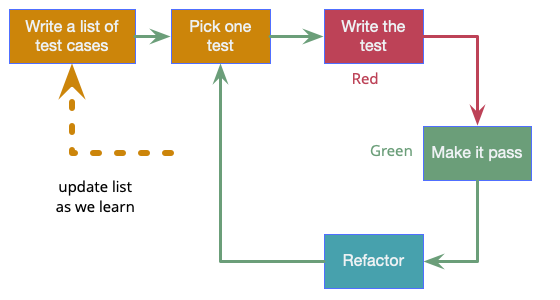Test-Driven Development (TDD) is a technique for building
software that guides software development by writing tests. It was
developed by Kent
Beck in the late 1990’s as part of
Extreme Programming. In essence we follow three simple
steps repeatedly:
- Write a test for the next bit of functionality you want to add.
- Write the functional code until the test passes.
- Refactor both new and old code to make it well structured.
Although these three steps, often summarized as Red – Green –
Refactor, are the heart of the process, there’s also a vital initial
step where we write out a list of test cases first. We then pick one of these
tests, apply red-green-refactor to it, and once we’re done pick the next.
Sequencing the tests properly is a skill, we want to pick tests that drive us
quickly to the salient points in the design. During the process we should add
more tests to our lists as they occur to us.
Writing the test first, what XPE2 calls
Test-First Programming, provides two main benefits. Most obviously it’s a way
to get SelfTestingCode, since we can only write some functional
code in response to making a test pass. The second benefit is that thinking
about the test first forces us to think about the interface to the code first.
This focus on interface and how you use a class helps us separate interface
from implementation, a key element of good design that many programmers
struggle with.
The most common way that I hear to screw up TDD is neglecting
the third step. Refactoring the code to keep it clean is a key part
of the process, otherwise we just end up with a messy aggregation of
code fragments. (At least these will have tests, so it’s a less
painful result than most failures of design.)
Revisions
My original post of this page was 2005-03-05. Inspired by Kent’s
canonical post, I updated it on 2023-12-11

